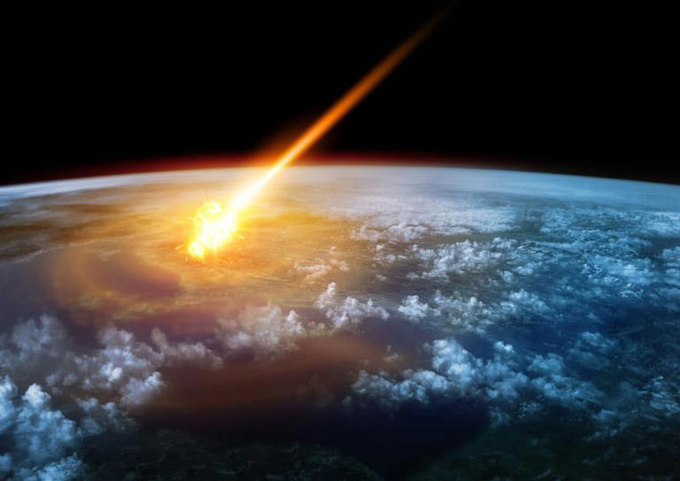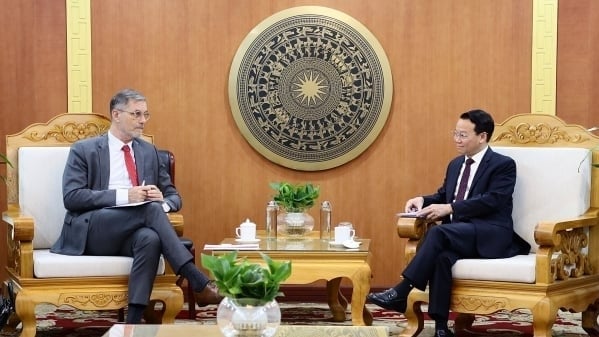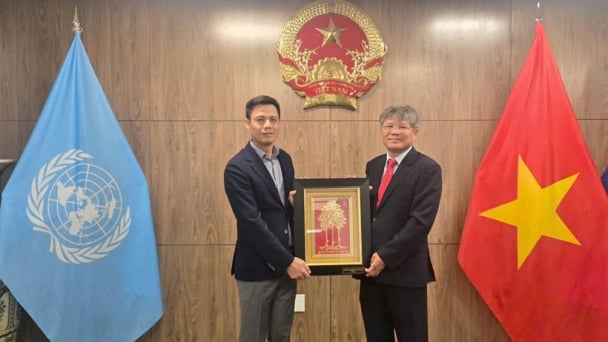May 22, 2025 | 16:14 GMT +7
May 22, 2025 | 16:14 GMT +7
Hotline: 0913.378.918
May 22, 2025 | 16:14 GMT +7
Hotline: 0913.378.918

Here comes the fertilizer.
The meteorite that wiped out the dinosaurs was an insignificant chunk of rock compared to a monster that slammed into the Earth billions of years earlier, creating enough heat to boil off the top layer of the oceans, researchers say.
The meteorite, known as S2, was up to 200 times bigger than the one that ended the age of the dinosaurs and it acted as a "fertilizer bomb" that gave life on Earth what it needed to flourish, researchers say.
In a study published in the Proceedings of the National Academy of Sciences, researchers say "giant impacts" like the one 3.26 billion years ago were "not just agents of destruction but also conferred transient benefits on early life."
Lead study author Nadja Drabon, a Harvard geologist, tells the CBC that the type of asteroid that hit contained a lot of phosphorus, which the early oceans were "really starved" of. "You can almost picture it like a fertilizer bomb that just put a lot of phosphorus like across the entire globe. And this is a very important nutrient for life," she says. The meteorite, believed to have been up to 37 miles in diameter, also caused a gigantic, planet-wide tsunami that "brought waters from the deep oceans that are rich in iron and nutrients up to the surface where life is living," Drabon says.
Drabon says the meteorite likely killed off microbes on what little land there was at the time and in the upper part of the ocean, but life survived in cracks in rocks and in the deep ocean.
After a few years or decades, life "not only survived and bounced back right away, but we actually think that it really bloomed," she says, though multicellular life didn't emerge until billions of years later.
Drabon and her team, one of multiple groups of scientists to independently determine that S2 aided the development of early life, collected hundreds of pounds of rock from a region in South Africa that has some of the oldest exposed rock on Earth, NBC News reports.
(MSN; Reuters)
![Reducing emissions from rice fields: [3] New values generated from carbon credit](https://t.ex-cdn.com/nongnghiepmoitruong.vn/608w/files/content/2025/05/19/dsc09613-144700_71-150957.jpg)
(VAN) In addition to helping safeguard the environment, the low-emission rice cultivation model also generates new opportunities for farmers by leveraging the carbon credit market.
![Ho Chi Minh city adapts to climate change: [1] Vulnerable in the whirlwind of development](https://t.ex-cdn.com/nongnghiepmoitruong.vn/608w/files/duyenht92/2025/05/19/3131-ngap-nongnghiep-163121.jpg)
(VAN) As the country's economic engine with a rapid urbanization rate, Ho Chi Minh city is facing increasingly serious consequences of climate change.

(VAN) On May 21, Minister of Agriculture and Environment Do Duc Duy worked with Mr. Olivier Brochet, Ambassador Extraordinary and Plenipotentiary of the French Republic to Vietnam.

(VAN) VRG recently conducted a visit and working trip to the United States to demonstrate its efforts in redefining the role of rubber enterprises in the global value chain.

(VAN) In 2024, over 295 million people across 53 countries and territories faced acute hunger—an increase of almost 14 million people compared to 2023, while the number of people facing catastrophic levels of hunger reached a record high.

(VAN) World Environment Day 2025 (June 5) carries the theme 'Beat Plastic Pollution' continuing to emphasize the global urgency of addressing the plastic waste crisis.

(VAN) This was the assessment shared by experts at the workshop titled 'Assessing the Role and Potential of Low-Emission Rice Production Systems in Vietnam,' held on the morning of May 19.